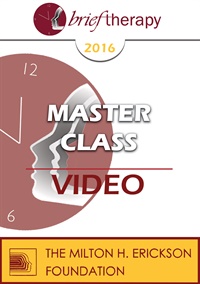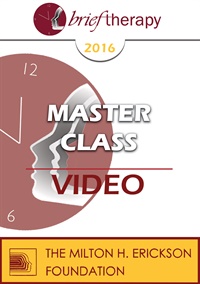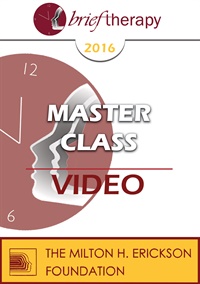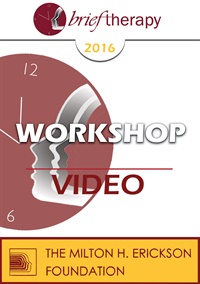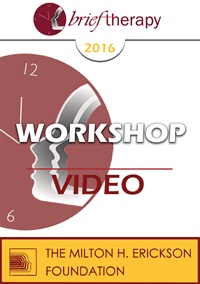- Average Rating:
- Not yet rated
- Topic Areas:
- Master Classes | Brief Therapy | Experiential Therapy | Gestalt | Hypnosis
- Categories:
- Brief Therapy Conference | Brief Therapy Conference 2016 | Master Class
- Faculty:
- Erving Polster, PhD | Jeffrey Zeig, PhD
- Course Levels:
- Master Degree or Higher in Health-Related Field
- Duration:
- 1:20:26
- Format:
- Audio and Video
- Original Program Date:
- Dec 12, 2016
- Short Description:
- Gestalt therapy and Ericksonian hypnotherapy are experiential methods of change. In combination they can be synergistic. Psychotherapy is best when clients have first-hand experience of an alive therapeutic process. Such dynamic empowering experiences pave the way for dynamic understandings. Drs. Polster and Zeig will engage with each other and participants to examine commonalities and differences in their work in this engaging all-day workshop.
- Price:
-
Sale is $29.00
price reduced from Base Price - $59.00
- Average Rating:
- Not yet rated
- Topic Areas:
- Master Classes | Brief Therapy | Experiential Therapy | Gestalt | Hypnosis
- Categories:
- Brief Therapy Conference | Brief Therapy Conference 2016 | Master Class
- Faculty:
- Erving Polster, PhD | Jeffrey Zeig, PhD
- Course Levels:
- Master Degree or Higher in Health-Related Field
- Duration:
- 2:18:49
- Format:
- Audio and Video
- Original Program Date:
- Dec 12, 2016
- Short Description:
- Gestalt therapy and Ericksonian hypnotherapy are experiential methods of change. In combination they can be synergistic. Psychotherapy is best when clients have first-hand experience of an alive therapeutic process. Such dynamic empowering experiences pave the way for dynamic understandings. Drs. Polster and Zeig will engage with each other and participants to examine commonalities and differences in their work in this engaging all-day workshop.
- Price:
-
Sale is $29.00
price reduced from Base Price - $59.00
- Average Rating:
- Not yet rated
- Topic Areas:
- Master Classes | Brief Therapy | Experiential Therapy | Gestalt | Hypnosis
- Categories:
- Brief Therapy Conference | Brief Therapy Conference 2016 | Master Class
- Faculty:
- Erving Polster, PhD | Jeffrey Zeig, PhD
- Course Levels:
- Master Degree or Higher in Health-Related Field
- Duration:
- 1:51:16
- Format:
- Audio and Video
- Original Program Date:
- Dec 12, 2016
- Short Description:
- Gestalt therapy and Ericksonian hypnotherapy are experiential methods of change. In combination they can be synergistic. Psychotherapy is best when clients have first-hand experience of an alive therapeutic process. Such dynamic empowering experiences pave the way for dynamic understandings. Drs. Polster and Zeig will engage with each other and participants to examine commonalities and differences in their work in this engaging all-day workshop.
- Price:
-
Sale is $29.00
price reduced from Base Price - $59.00
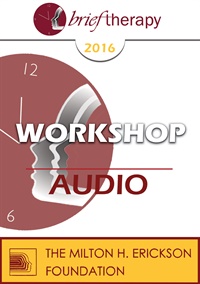
- Average Rating:
- Not yet rated
- Topic Areas:
- Happiness | Workshops | Brief Therapy | Neuroscience | Therapist Development
- Categories:
- Brief Therapy Conference | Brief Therapy Conference 2016
- Faculty:
- Dan Short, PhD
- Duration:
- 2:46:42
- Format:
- Audio Only
- Original Program Date:
- Dec 11, 2016
- Short Description:
- Learn the essential mindsets, strategies and dialogue needed to help clients become independent and happy. In this model, each and every problem is viewed as an opportunity to discover new abilities and expanded choice. In addition to solving the presenting problem, clients are empowered for a lifetime of skillful problem solving.
- Price:
- $15.00 - Base Price
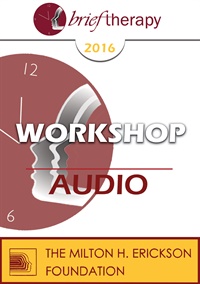
- Average Rating:
- Not yet rated
- Topic Areas:
- Workshops | Brief Therapy | Ericksonian Hypnosis and Therapy Techniques | Research | Therapist Development
- Categories:
- Brief Therapy Conference | Brief Therapy Conference 2016
- Faculty:
- Jeffrey Zeig, PhD
- Duration:
- 2:02:54
- Format:
- Audio Only
- Original Program Date:
- Dec 11, 2016
- Short Description:
- Skills and experience, research and theory ... each plays a central role in the development of effective therapy practice. And then there is something else. When we recall the work of such figures as Milton Erickson, Virginia Satir, and Carl Whitaker, we detect another layer: artistry. Surprisingly, artistry is something that can be taught, or more accurately, expanded. Everyone has the capacity. And it is artistry that brings forth all of that skill, experience, research and theory in effective and generative ways.
- Price:
- $15.00 - Base Price
- Average Rating:
- Not yet rated
- Topic Areas:
- Workshops | Therapist Development | Ericksonian Hypnosis and Therapy Techniques
- Categories:
- Brief Therapy Conference | Brief Therapy Conference 2016
- Faculty:
- Michael Yapko, PhD
- Course Levels:
- Master Degree or Higher in Health-Related Field
- Duration:
- 2:37:59
- Format:
- Audio and Video
- Original Program Date:
- Dec 11, 2016
- Short Description:
- This session explores the central role of discrimination strategies in therapy, emphasizing how ambiguity, global thinking, and rigid philosophies increase vulnerability to depression and anxiety. Participants learn practical methods for guiding clients to distinguish controllable from uncontrollable factors, useful analysis from rumination, and realistic from unrealistic expectations. Through humor, metaphor, and clinical demonstration, the workshop highlights how critical thinking and reality testing can transform therapy into a process of helping clients make better choices in complex situations.
- Price:
-
Sale is $29.00
price reduced from Base Price - $59.00
Tags: Interviewing
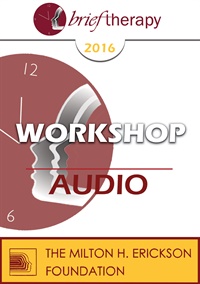
- Average Rating:
- Not yet rated
- Topic Areas:
- Workshops | Brief Therapy | Solution Oriented Approach | Strategic Therapy
- Categories:
- Brief Therapy Conference | Brief Therapy Conference 2016
- Faculty:
- Michael Munion, MA, LPC
- Duration:
- 2:30:59
- Format:
- Audio Only
- Original Program Date:
- Dec 11, 2016
- Short Description:
- This workshop examines the distinctions among Brief, Solution-Focused, and Strategic interventions, with emphasis given to development of genuinely strategic interventions. The workshop also provides a framework for assessing clients along two important dimensions that impact therapeutic outcome: motivation and sense of agency (one’s perception of their ability to create change in their own lives).
- Price:
- $15.00 - Base Price
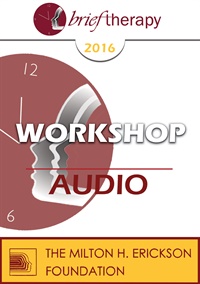
- Average Rating:
- Not yet rated
- Topic Areas:
- Workshops | Mind-Body | Research | Brief Therapy | Neuroscience
- Categories:
- Brief Therapy Conference | Brief Therapy Conference 2016
- Faculty:
- Ernest Rossi, PhD | Richard Hill, MBMSc, MEd, MA
- Duration:
- 2:21:47
- Format:
- Audio Only
- Original Program Date:
- Dec 11, 2016
- Short Description:
- We will review the little-known history of the MHE/Ravitz/Rossi research, which developed the first quantum electrodynamic field theory of therapeutic hypnosis from 1950 to 2016. We will use the STEM (Science, Technology, Engineering, and Math) perspective to plan, promote & publish research on MHE’s naturalistic hypnosis, consciousness, cognition & therapeutic states in Open Access High Impact Scientific Journals. Everyone is welcome to this first organizational meeting.
- Price:
- $15.00 - Base Price
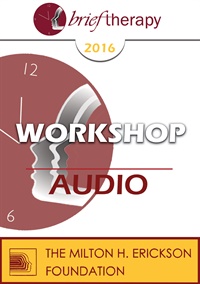
- Average Rating:
- Not yet rated
- Topic Areas:
- Workshops | Gestalt | Brief Therapy
- Categories:
- Brief Therapy Conference | Brief Therapy Conference 2016
- Faculty:
- Robert Resnick, PhD
- Duration:
- 1:43:14
- Format:
- Audio Only
- Original Program Date:
- Dec 11, 2016
- Short Description:
- A powerful, process and solidly theoretical model, Contemporary Gestalt therapy is based on Applied Dialogic Existential Phenomenology. Bob Resnick, trained and personally certified by Fritz Perls (1969) was chosen by Perls to introduce Gestalt Therapy to Europe. Theory and live demonstrations. Comments, questions, discussions—and a sense of humor—are welcome.
- Price:
- $15.00 - Base Price
Tags: Brief Therapy Gestalt Therapy
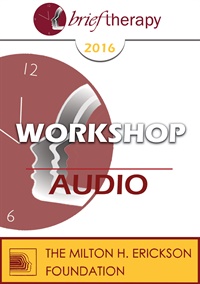
- Average Rating:
- Not yet rated
- Topic Areas:
- Workshops | Brief Therapy | Interviewing
- Categories:
- Brief Therapy Conference | Brief Therapy Conference 2016
- Faculty:
- Wendel Ray, PhD
- Duration:
- 2:53:37
- Format:
- Audio Only
- Original Program Date:
- Dec 11, 2016
- Short Description:
- Conceptually simple, MRI Brief Therapy takes seriously the idea that it is not so much problems in living that bring people into therapy, but ineffective efforts being made to resolve those difficulties that inadvertently exacerbate and perpetuate the problem into irresolvable vicious cycles. Effective brief therapy facilitates clients to Interrupt efforts being made to resolve the problem that inadvertently perpetuate the problem, and in doing so the problem often dissipates on its own.
- Price:
- $15.00 - Base Price
Tags: Brief Therapy Interviewing
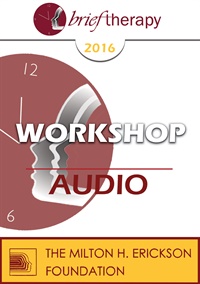
- Average Rating:
- Not yet rated
- Topic Areas:
- Psychology | Workshops | Brief Therapy | Therapeutic Relationship | Relationships
- Categories:
- Brief Therapy Conference | Brief Therapy Conference 2016
- Faculty:
- Bill O'Hanlon, MS
- Duration:
- 2:17:22
- Format:
- Audio Only
- Original Program Date:
- Dec 11, 2016
- Short Description:
- In brief therapy, we have to be better than long-term therapists in getting people to change and cooperate with treatment. Recent research from social psychology, behavioral economics and the new brain science show three powerful principles for being persuasive. Why do marketers know all this and most therapists do not? Come and learn how to be at least as persuasive as marketers.
- Price:
- $15.00 - Base Price
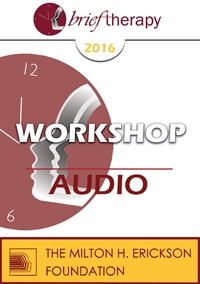
- Average Rating:
- Not yet rated
- Topic Areas:
- Anxiety | Children and Adolescent Therapy | Workshops | Brief Therapy | Family Therapy
- Categories:
- Brief Therapy Conference | Brief Therapy Conference 2016
- Faculty:
- Lynn Lyons, LICSW
- Duration:
- 2:41:37
- Format:
- Audio Only
- Original Program Date:
- Dec 11, 2016
- Short Description:
- When children and their parents are in the grips of worry and stress, it feels overwhelming and mysterious. Anxiety is a very persistent master; when it moves into families, it takes over daily routines, schoolwork, bedtime and recreation. To make matters worse, the things adults (including many therapist and school systems) do to help and console anxious children actually make the anxiety stronger.
- Price:
- $15.00 - Base Price
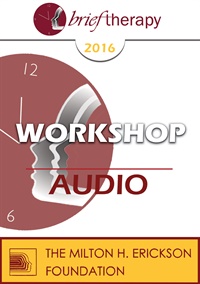
- Average Rating:
- Not yet rated
- Topic Areas:
- Anxiety | Workshops | Brief Therapy | Pain and Healing | Psychotherapy
- Categories:
- Brief Therapy Conference | Brief Therapy Conference 2016
- Faculty:
- Assen Alladin, PhD
- Duration:
- 2:48:47
- Format:
- Audio Only
- Original Program Date:
- Dec 11, 2016
- Short Description:
- This workshop shows how emotional injuries shape anxiety and how clinicians can access and heal those deeper layers. Participants learn an integrative approach that blends CBT, mindfulness, and hypnotherapeutic methods to uncover implicit fears, strengthen adult ego states, and create lasting change beyond symptom relief.
- Price:
- $15.00 - Base Price

- Average Rating:
- Not yet rated
- Topic Areas:
- Psychotherapy | Workshops | Attunement | Therapeutic Relationship | Brief Therapy
- Categories:
- Brief Therapy Conference | Brief Therapy Conference 2016
- Faculty:
- Jeffrey Zeig, PhD
- Duration:
- 2:31:48
- Format:
- Audio Only
- Original Program Date:
- Dec 11, 2016
- Short Description:
- Attunement can be considered the deepest level of rapport, a foundation of empathy. We will learn how to attune to affect, behavior, cognition, attitude, perception, and relationship patterns —even how to attune to the preconscious associations that drive behavior. A precursor to every intervention, attunement will be described from the perspective of hypnosis, psychotherapy, and social psychology. Clinical applications will be demonstrated and discussed. Includes small-group practice exercises.
- Price:
- $15.00 - Base Price
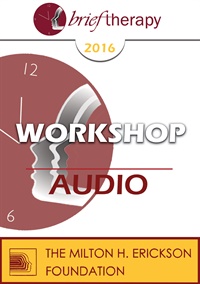
- Average Rating:
- Not yet rated
- Topic Areas:
- Depression | Workshops | Ericksonian Hypnosis and Therapy Techniques
- Categories:
- Brief Therapy Conference | Brief Therapy Conference 2016
- Faculty:
- Michael Yapko, PhD
- Duration:
- 2:33:04
- Format:
- Audio Only
- Original Program Date:
- Dec 11, 2016
- Short Description:
- This workshop shows how depression is sustained by patterns of global thinking, passivity, and poor decision-making. Through clinical examples—from clients overwhelmed by unrealistic goals to those caught in rigid self-definitions—participants see how psychoeducation, hypnosis, and experiential learning can shift perspectives. The session highlights practical ways to strengthen coping, reduce relapse, and help clients move from helplessness to resilience.
- Price:
- $15.00 - Base Price
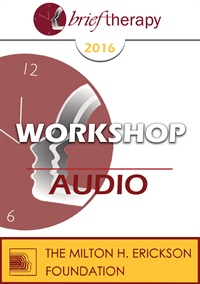
- Average Rating:
- Not yet rated
- Topic Areas:
- Couples Therapy | Trance | Workshops | Hypnotic Induction
- Categories:
- Brief Therapy Conference | Brief Therapy Conference 2016 | Pioneers in Couples and Family Therapy
- Faculty:
- Stan Tatkin, PsyD, MFT
- Duration:
- 3:11:14
- Format:
- Audio Only
- Original Program Date:
- Dec 11, 2016
- Short Description:
- This workshop (the first of two) introduces the use of informal trance and rolling chairs in couple therapy to support arousal regulation and deeper relational work. Drawing from the Psychobiological Approach to Couple Therapy (PACT), the session demonstrates how proximity, eye contact, and movement can elicit trance states, enabling therapists to access implicit issues. Techniques like the crossing and “down the middle” methods help clarify dynamics and promote secure functioning. Attendees learn to manage emotional states, reduce stress loads, and guide partners toward more resilient connection.
- Price:
- $15.00 - Base Price
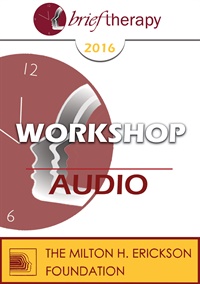
- Average Rating:
- Not yet rated
- Topic Areas:
- Family Therapy | Workshops | Family Constellations | Brief Therapy
- Categories:
- Brief Therapy Conference | Brief Therapy Conference 2016
- Faculty:
- Andreas Steiner, Dipl.-Psych., M.A.
- Duration:
- 2:41:08
- Format:
- Audio Only
- Original Program Date:
- Dec 11, 2016
- Short Description:
- Family Constellations are a treatment method invented by Bert Hellinger and developed by his expositors. This well-grounded and solution-oriented application can change recalcitrant problems in a short time because it addresses core issues and utilizes the power of the family system, revealing hidden gemstones of love. Restoring the natural symmetry of respect and affiliation rids clients of the burdens that make life painful and sad. Constellations can optimize life energy and diffuse problematic scripts that cause redundant dysfunctional patterns.
- Price:
- $15.00 - Base Price
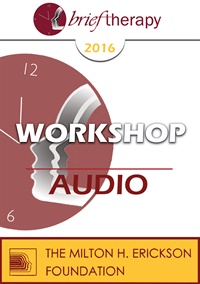
- Average Rating:
- Not yet rated
- Topic Areas:
- Psychotherapy | Workshops | Mind-Body | Brief Therapy | Meditation, Spirituality and Yoga
- Categories:
- Brief Therapy Conference | Brief Therapy Conference 2016
- Faculty:
- Ernest Rossi, PhD | Richard Hill, MBMSc, MEd, MA
- Duration:
- 2:41:12
- Format:
- Audio Only
- Original Program Date:
- Dec 11, 2016
- Short Description:
- We will summarize the Rossi 50+ year saga of exploring the theory, research and practice of Mind-Body Psychotherapy with live demonstrations for the entire audience as well as individual volunteers with a focus on 4 Essential keys: 1. Milton Erickson’s Minimal Cues Optimizing Therapeutic Hypnosis, 2. The 90-120 minute 4-Stage Creative Cycle, 3.The Novelty-Numinosum-Neurogenesis Effect , 4.The Basic Rest-Activity Cycle of Everyday Mind-Body Healing. Yoga activity will be experienced as appropriate through-out.
- Price:
- $15.00 - Base Price

- Average Rating:
- Not yet rated
- Topic Areas:
- Workshops | Brief Therapy | Therapeutic Relationship | Therapist Development
- Categories:
- Brief Therapy Conference | Brief Therapy Conference 2016
- Faculty:
- Bill O'Hanlon, MS
- Duration:
- 2:47:28
- Format:
- Audio Only
- Original Program Date:
- Dec 11, 2016
- Short Description:
- There are features that most brief therapies share. Dropping all the theoretical jargon, it becomes very simple. This presentation will provide a simple way to get therapy started on the right foot so it ends well and as quickly as possible.
- Price:
- $15.00 - Base Price
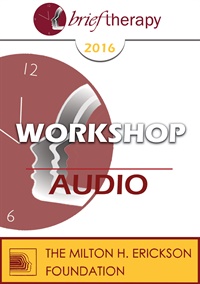
- Average Rating:
- Not yet rated
- Topic Areas:
- Workshops | Brief Therapy | LGBTQ | Hypnosis
- Categories:
- Brief Therapy Conference | Brief Therapy Conference 2016
- Faculty:
- Rick Miller, MSW
- Duration:
- 2:14:18
- Format:
- Audio Only
- Original Program Date:
- Dec 11, 2016
- Short Description:
- It is essential to know something of the deep and complicated background of all gay men, including the myriad consequences of growing up a minority even in one’s own family, in which self-identity takes shape when there is no mirror. In this workshop, you will be introduced to powerful strategies for enhancing and increasing sensory awareness, and for creating resources for restoring connections within. Such connections provide a bridge between the self and body, something that is often disowned by gay men.
- Price:
- $15.00 - Base Price
Tags: Gay Hypnosis LGBTQ Brief Therapy
- Average Rating:
- Not yet rated
- Topic Areas:
- Anxiety | Depression | Hypnosis | Children and Adolescent Therapy | Workshops | Humor
- Categories:
- Brief Therapy Conference | Brief Therapy Conference 2016
- Faculty:
- Lynn Lyons, LICSW
- Course Levels:
- Master Degree or Higher in Health-Related Field
- Duration:
- 2:47:32
- Format:
- Audio and Video
- Original Program Date:
- Dec 11, 2016
- Short Description:
- Anxiety and depression go hand in hand; untreated anxiety during childhood is a top predictor of depression in adolescents and young adults. This workshop teaches how to interrupt the patterns of anxiety and depression in children, first by recognizing what patterns need to change and then using creative and hypnotic language, homework, humor to actively make shifts happen. Concrete strategies are based on three frames that help simplify and target the patterns so common in anxiety, depression, somatic, and sleep problems.
- Price:
-
Sale is $29.95
price reduced from Base Price - $59.00
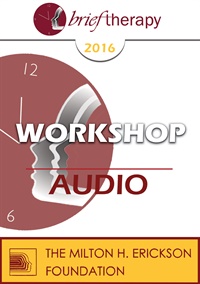
- Average Rating:
- Not yet rated
- Topic Areas:
- Workshops | Metaphors | Unconscious Processes | Brief Therapy
- Categories:
- Brief Therapy Conference | Brief Therapy Conference 2016
- Faculty:
- Connirae Andreas, PhD
- Duration:
- 2:24:50
- Format:
- Audio Only
- Original Program Date:
- Dec 11, 2016
- Short Description:
- This experiential workshop introduces a distinctive way of working with metaphor by uncovering the client’s own unconscious image of a stuck situation. Through live examples and guided practice, participants learn how spatial metaphors, direction, and movement can clarify where someone is, what keeps them there, and how small shifts can open new possibilities without interpretation or advice-giving.
- Price:
- $15.00 - Base Price
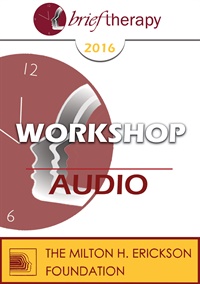
- Average Rating:
- Not yet rated
- Topic Areas:
- Workshops | Single-Session | Brief Therapy | Therapist Development
- Categories:
- Brief Therapy Conference | Brief Therapy Conference 2016
- Faculty:
- Michael Hoyt, PhD
- Duration:
- 2:03:30
- Format:
- Audio Only
- Original Program Date:
- Dec 11, 2016
- Short Description:
- BT16 Workshop 24 - Single Session Therapy: When the First Session May Be The Last - Michael Hoyt, PhDThe most common length of treatment is one session. In this workshop, guidelines will be presented for recognizing which patients are most likely to benefit from a single session and how we can provide it successfully. A structure will be presented for organizing the specific tasks and skills involved in different phases of therapy (pre-, early, middle, late, follow-through). Case examples, some on videotape, will illustrate brief therapy techniques applicable in a one-session-at-a-time therapy and in the course of longer treatments.
- Price:
- $15.00 - Base Price
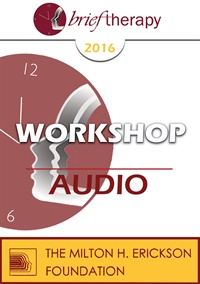
- Average Rating:
- Not yet rated
- Topic Areas:
- Workshops | Brief Therapy | Therapist Development
- Categories:
- Brief Therapy Conference | Brief Therapy Conference 2016
- Faculty:
- Wendel Ray, PhD
- Duration:
- 2:44:11
- Format:
- Audio Only
- Original Program Date:
- Dec 11, 2016
- Short Description:
- Fundamental concepts central to present-day effective systemic therapy will be described in this presentation. The connection between present day systemic therapies and research conducted during the 1950s and 1960s by the Palo Alto Group and the Mental Research Institute (MRI) will be described. Featured will be the contributions of Palo Alto Group members Gregory Bateson, Don Jackson, MD, John Weakland, Jay Haley, and William Fry. Seven specific, learnable concepts and techniques will be taught that make treatment more effective and efficient.
- Price:
- $15.00 - Base Price
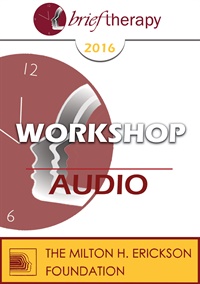
- Average Rating:
- Not yet rated
- Topic Areas:
- Workshops | Couples Therapy | Hypnotic Induction | Trance
- Categories:
- Brief Therapy Conference | Brief Therapy Conference 2016 | Pioneers in Couples and Family Therapy
- Faculty:
- Stan Tatkin, PsyD, MFT
- Duration:
- 2:58:09
- Format:
- Audio Only
- Original Program Date:
- Dec 11, 2016
- Short Description:
- This workshop (the second of two) introduces the use of informal trance and rolling chairs in couple therapy to support arousal regulation and deeper relational work. It also showcases body-based techniques like the "Lovers Pose" and "King and Queen" exercises. Drawing from the Psychobiological Approach to Couple Therapy (PACT), it demonstrates how stationary positioning, eye contact, and right-brain engagement access implicit memory and deepen emotional connection. Through live and video demonstrations, participants learn to manage arousal, shift power dynamics, and guide couples toward secure attachment and healing.
- Price:
- $15.00 - Base Price


